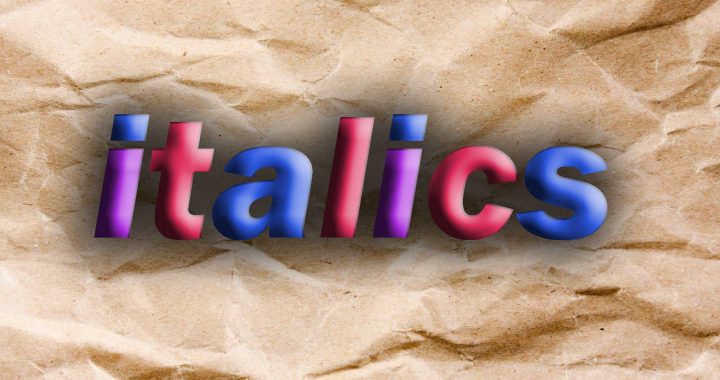How To Use Italics In Your Writing
We all know italics as the slanted style of writing used for different purposes in text. But are you aware of their full range of purposes? Knowing the difference between appropriate and inappropriate use of italics Can make a big difference to the quality of your work. It’s important to understand the different and specific uses for italics, and not use them indiscriminately.
One of the most common uses of italics is for emphasis. In any text a word may need to stand out in a certain way, for effect, or to emphasise a usage that diverges from the usual meaning. By applying italics to alter the appearance of a word, we’re able to achieve the desired effect. However, it’s important not to overuse italics for this purpose. Save it for those particular words that really need to stand out in the flow of your text. Examples of this emphatic usage are:
‘I don’t know what you’re talking about. I did post the letters.’
Despite the scepticism of the others, Steve was certain he had seen a ghostly figure.
In everyday communication we may use words or phrases from other languages, and in writing these borrowings should be styled using italics. This no longer applies once the word or phrase has been anglicised and is accepted as part of the English language. Café, for example, was not originally an English word, but has become part of the language and doesn’t now need italicising.
Italics are used for titles of works, such as:
- books, plays and newspapers
- film and TV series
- CDs and albums
- digital resources such as apps and video games
- long poems
- series of fictional works (but quotation marks are sometimes used for this purpose)
- paintings and operas.
Though it’s a general convention to use italics for titles of created works, there are exceptions to watch out for. While the titles of music albums are italicised, song titles are not. Long poems require italics, but short poems do not.
Italics are required for ships’ names (but not the prefix, eg. HMS Hood), and stage directions in scripts for plays or films (most famously perhaps, Exit, pursued by a bear).
If you work in a scientific or technical area you need to know how italics are used in your particular discipline, when terms and titles are written formally. This is particularly so with academic references, bibliographies, and lists of publications. The standard editors’ reference books give full details for using italics, and the vigilant editor will consult them repeatedly to ensure that such style features are applied correctly. You may think you know without checking, but if you have the slightest doubt, look it up!
Matters of style, including the correct use of italics, can make a significant difference to the quality of your work and the presentation of your writing. At Betterwrite we aim to ensure that these features of written English are used appropriately and effectively, saving you precious time as a writer, and reassuring your readers that your work has been thoroughly and professionally edited.
SD
Editor and Betterwrite Associate

